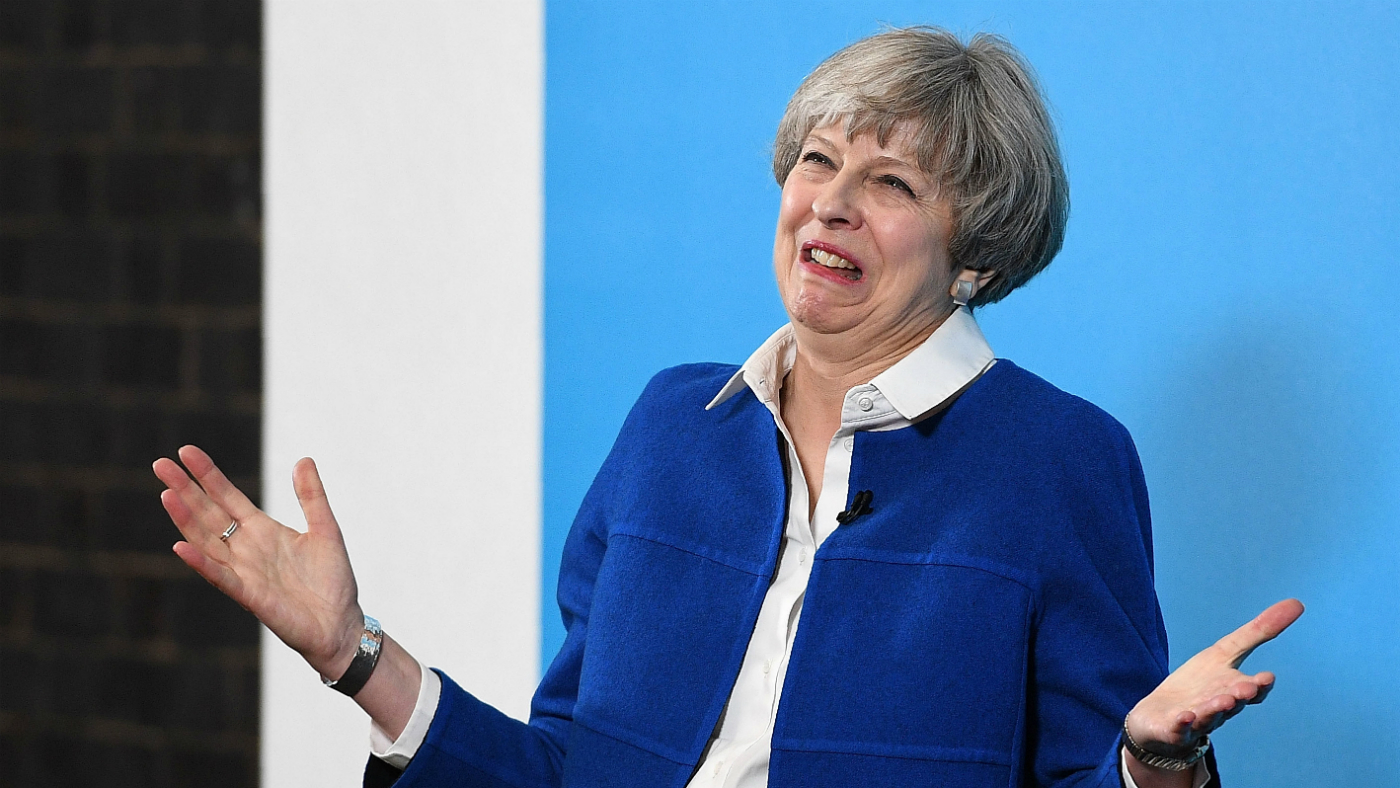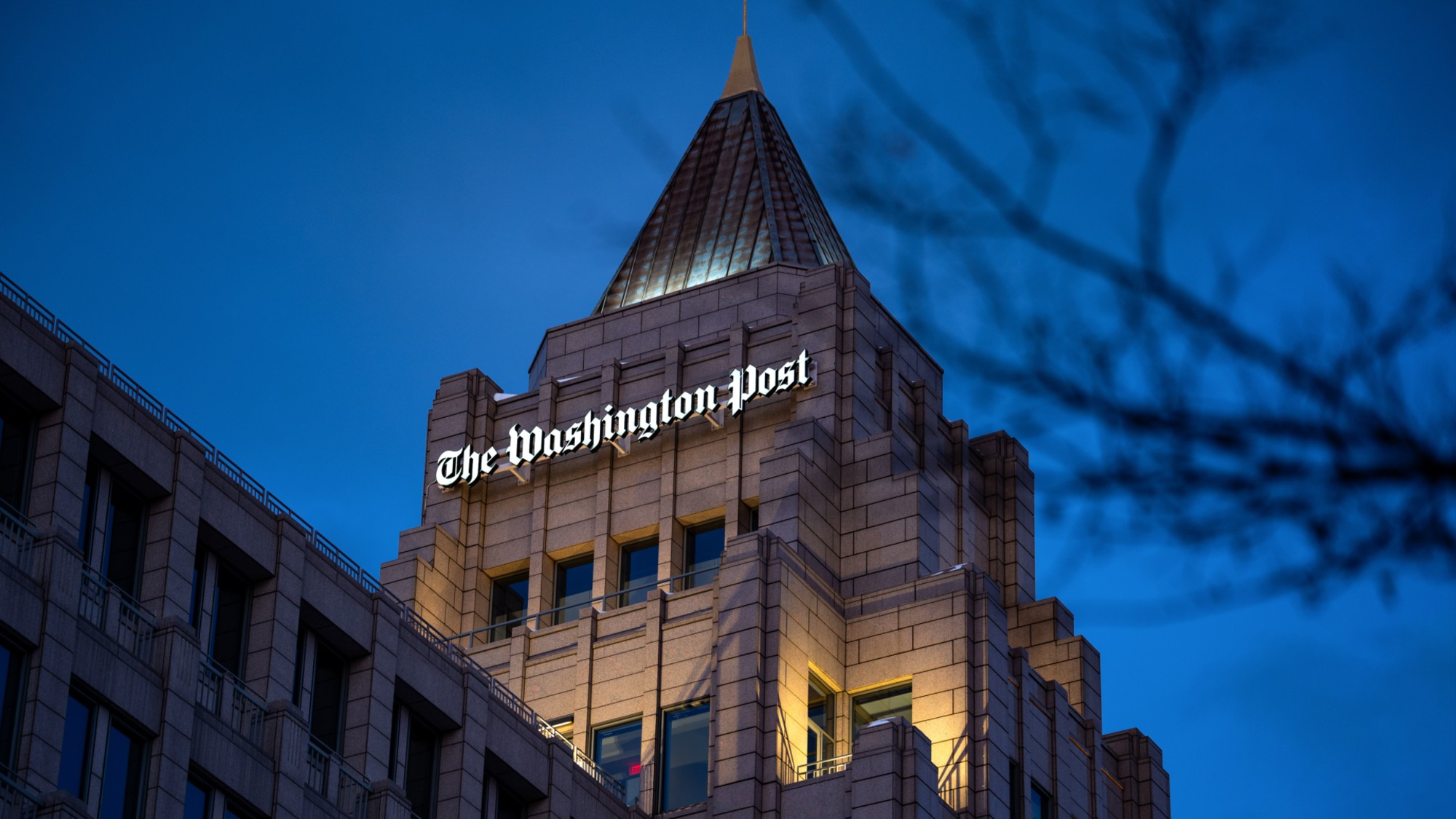Hung parliament: How are markets reacting to tightening polls?
Sterling has undulated after a YouGov poll predicted May would lose her parliamentary majority

A free daily email with the biggest news stories of the day – and the best features from TheWeek.com
You are now subscribed
Your newsletter sign-up was successful
The pound fell sharply at the beginning of trading Wednesday - adding to losses at the end of last week - and is very choppy right now as the general election polls tighten dramatically.
One shock analysis reckons the Tories could not only fail to add meaningfully to their majority, but lose it altogether.
What's happening in the markets?
The Week
Escape your echo chamber. Get the facts behind the news, plus analysis from multiple perspectives.

Sign up for The Week's Free Newsletters
From our morning news briefing to a weekly Good News Newsletter, get the best of The Week delivered directly to your inbox.
From our morning news briefing to a weekly Good News Newsletter, get the best of The Week delivered directly to your inbox.
Early on Wednesday the pound fell 0.5 per cent to a little above $1.27 against the dollar, says the BBC, its lowest level in more than a month.
But by the end of the day, it was trading 0.4 per cent up at a little above $1.29, although it was still marginally down against the euro. It's settled somewhere between the two positions this morning.
The FTSE 100 fell by the end of yesterday by a modest 0.1 per cent to 7,520, says MarketWatch. But it's now back up at a new record level and rose 4.4 per cent in May, its biggest rise since December.
What's causing the volatility?
A free daily email with the biggest news stories of the day – and the best features from TheWeek.com
Shockwaves were produced mid-week by the release of the election's first YouGov analysis that sets out to predict parliamentary seat numbers.
The poll is sensational because it predicts a hung parliament: the Conservatives would lose 20 seats to 310 and Labour would gain 28 to 257. This is a far cry from the almost unanimous assumption of a Tory majority.
That same pollster published another standard survey result on Thursday, putting the Tory lead at just three points on 42 per cent to 39 per cent. At the beginning of the campaign, YouGov put the lead at 24 per cent.
According to YouGov's projection, the Conservative lead is therefore collapsing and the chances of a Labour win – or at least of Jeremy Corbyn becoming prime minister – are rising.
So the markets prefer a Conservative win?
According to most analysts, yes. In fact they particularly want the Tories to win a big majority.
"The markets seem to be saying that a strong Tory majority is better for the pound and better for equities," says Nigel Wilson of the online trading broker ETX Capital.
The general assumption is that Brexit is the big issue for markets and a big Tory majority offers more stability going into these negotiations – and gives Theresa May more scope to look beyond the hard Brexit instincts of some backbenchers.
Why aren't the markets falling more, then?
That's a good question. After all, the pound is still well up for this year and since the general election was called in mid-April. And the FTSE 100 has risen back to a new record this morning.
To some, this reflects a general scepticism with the YouGov analysis – and it's certainly true that most other polls still give the Conservatives a sizeable lead.
"Latest surveys by ICM and ComRes found a Tory lead of 12, while Survation had the lead at six points," says the London Evening Standard.
Yesterday Britain Elects, the respected polling aggregator, published its first Nowcast. This works similar to the YouGov model in that it assigns the probability of parliamentary seats changing hands based on poll-of-polls data transposed to constituencies through historic demographic breakdowns.
It puts the Tories on 44 per cent and likely to win 32 more seats than in 2015, for a total of 362. Labour would lose 26 seats for a relatively disastrous total of 206 seats - and the Conservative majority would be a healthy 74 seats, up from 10.
As for the YouGov analysis, it derives from interviews with 50,000 people that were assigned to constituencies based on past data. The pollster itself cited a wide margin for error and said that on a "good night" the Tory seat count could be as high as 345.
Despite all this, the polls have certainly narrowed across the board. It's now much more plausible that Labour might be elected, which doesn't appear to be spooking traders as much as some thought it might.
Who would be PM if YouGov were right?
Jeremy Corbyn, whose manifesto promises hefty tax increases on businesses and trading, is still unlikely to get into Number 10 - and that might also be helping market sentiment.
Even if he partnered up with the Scottish National Party, the Liberal Democrats, the Greens and Plaid Cymru, YouGov shows the seat tally for the so-called "Progressive Alliance" would be 321 – still short of a majority.
So it remains likely that the Tories would lead any government, albeit with a reduced majority and probably in coalition, limiting the party's freedom in Brexit talks.
Are markets solely acting based on the election?
Not at all - and certainly less than you might think given the apparently historic nature of the vote this time around.
So, despite the likes of Fawad Razaqzada, market analyst at Forex.com, saying "UK [economic and business] data should continue to play second fiddle to politics until the elections are over", most analysts are this morning saying the FTSE's new record high is being driven by buoyancy on Wall Street and positive construction data.
That latter point is being picked up particularly this morning: the UK construction purchasing managers index rose from 53.1 to 56, pointing to faster expansion to come.
It might be that uncertainty over the election would be having a greater effect if traders believed the result was in doubt - until then they are finding reasons to be cheerful elsewhere.
-
 Nepal’s fake mountain rescue fraud
Nepal’s fake mountain rescue fraudUnder The Radar Arrests made in alleged $20 million insurance racket
-
 History-making moments of Super Bowl halftime shows past
History-making moments of Super Bowl halftime shows pastin depth From Prince to Gloria Estefan, the shows have been filled with memorable events
-
 The Washington Post is reshaping its newsroom by laying off hundreds
The Washington Post is reshaping its newsroom by laying off hundredsIn the Spotlight More than 300 journalists were reportedly let go
-
 Labour shortages: the ‘most urgent problem’ facing the UK economy right now
Labour shortages: the ‘most urgent problem’ facing the UK economy right nowSpeed Read Britain is currently in the grip of an ‘employment crisis’
-
 Will the energy war hurt Europe more than Russia?
Will the energy war hurt Europe more than Russia?Speed Read European Commission proposes a total ban on Russian oil
-
 Will Elon Musk manage to take over Twitter?
Will Elon Musk manage to take over Twitter?Speed Read The world’s richest man has launched a hostile takeover bid worth $43bn
-
 Shoppers urged not to buy into dodgy Black Friday deals
Shoppers urged not to buy into dodgy Black Friday dealsSpeed Read Consumer watchdog says better prices can be had on most of the so-called bargain offers
-
 Ryanair: readying for departure from London
Ryanair: readying for departure from LondonSpeed Read Plans to delist Ryanair from the London Stock Exchange could spell ‘another blow’ to the ‘dwindling’ London market
-
 Out of fashion: Asos ‘curse’ has struck again
Out of fashion: Asos ‘curse’ has struck againSpeed Read Share price tumbles following the departure of CEO Nick Beighton
-
 Universal Music’s blockbuster listing: don’t stop me now…
Universal Music’s blockbuster listing: don’t stop me now…Speed Read Investors are betting heavily that the ‘boom in music streaming’, which has transformed Universal’s fortunes, ‘still has a long way to go’
-
 EasyJet/Wizz: battle for air supremacy
EasyJet/Wizz: battle for air supremacySpeed Read ‘Wizz’s cheeky takeover bid will have come as a blow to the corporate ego’